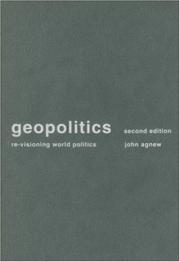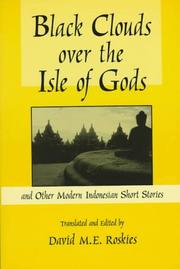| Listing 1 - 10 of 17 | << page >> |
Sort by
|

ISBN: 0415310075 0415310067 1134389523 1280073934 0203413733 1134389515 0203015614 9780203015612 9780203413739 0203758552 9780203758557 9780415310062 9780415310079 0203341066 1134769342 1280338393 9781134389476 9781134389513 9781134389520 Year: 2003 Publisher: London Routledge
Abstract | Keywords | Export | Availability | Bookmark
 Loading...
Loading...Choose an application
- Reference Manager
- EndNote
- RefWorks (Direct export to RefWorks)
Geopolitics identifies and scrutinizes the central features of geopolitics from the sixteenth century to the present, paying close attention to its persisting conceptual underpinnings, novel turns and shifting impacts.
International relations. Foreign policy --- Geopolitics --- Géopolitique --- History --- Histoire --- 327.5 --- 911.3:32 --- Political geography --- Geography, Political --- Human geography --- World politics --- Internationale conflicten. Internationale spanningen. Internationale blokvorming. Veiligheidspolitiek --- Geopolitiek. Politieke geografie --- Geopolitics. --- 911.3:32 Geopolitiek. Politieke geografie --- 327.5 Internationale conflicten. Internationale spanningen. Internationale blokvorming. Veiligheidspolitiek --- Géopolitique --- Political geography.
Book
Abstract | Keywords | Export | Availability | Bookmark
 Loading...
Loading...Choose an application
- Reference Manager
- EndNote
- RefWorks (Direct export to RefWorks)
#SBIB:327.7H233 --- #SBIB:327.5H10 --- 327.5 EU --- 327.5 EU Internationale conflicten. Internationale spanningen. Internationale blokvorming. Veiligheidspolitiek--EU --- Internationale conflicten. Internationale spanningen. Internationale blokvorming. Veiligheidspolitiek--EU --- Europese Unie: externe relaties, buitenlands- en defensiebeleid (ook WEU) --- Strategie: algemeen --- E-books
Book
ISBN: 9059900197 Year: 2003 Publisher: Antwerpen Meulenhoff / Manteau
Abstract | Keywords | Export | Availability | Bookmark
 Loading...
Loading...Choose an application
- Reference Manager
- EndNote
- RefWorks (Direct export to RefWorks)
rtitel op de kaft : Herinneringen aan de oorlogen in het Midden-Oosten
oorlogsjournalistiek --- Polemology --- Journalism --- Middle East --- 327.5 --- 355.4 <5-011> --- #SBIB:034.GIFT --- #SBIB:309H1025 --- #SBIB:309H302 --- #SBIB:328H512 --- 241 Hedendaagse wereldproblemen --- 852 Internationale conflicten --- Midden-Oosten --- Golfoorlog --- Irak --- journalistiek --- 092.9 --- 327.5 Internationale conflicten. Internationale spanningen. Internationale blokvorming. Veiligheidspolitiek --- Internationale conflicten. Internationale spanningen. Internationale blokvorming. Veiligheidspolitiek --- 355.4 <5-011> Oorlogvoering. Tactiek en strategie. Oorlogsoperaties. Militaire operaties. Operatieterrein--Nabije-Oosten. Midden-Oosten --- Oorlogvoering. Tactiek en strategie. Oorlogsoperaties. Militaire operaties. Operatieterrein--Nabije-Oosten. Midden-Oosten --- Mediaboodschappen met een informatieve functie --- De communicator: opleiding, statuut, deontologie, zelfbeeld, sociale positie,.. --- Instellingen en beleid: Midden-Oosten / landen in het Midden-Oosten --- pers en journalistiek - overige onderwerpen --- Journalistiek --- Oorlogsjournalistiek --- Politiek --- Geweld --- De communicator: opleiding, statuut, deontologie, zelfbeeld, sociale positie,. --- Maatschappij --- Film --- Reizen --- Ziekte --- Vliegen (werkwoord) --- De communicator: opleiding, statuut, deontologie, zelfbeeld, sociale positie,
Book
ISBN: 9789462703070 9462703078 9789461664228 9461664222 Year: 2021 Publisher: Leuven
Abstract | Keywords | Export | Availability | Bookmark
 Loading...
Loading...Choose an application
- Reference Manager
- EndNote
- RefWorks (Direct export to RefWorks)
This book focuses on the political exile of Catholic Christian Democrats during the global twentieth century, from the end of the First World War to the end of the Cold War. Transcending the common national approach, the present volume puts transnational perspectives at center stage and in doing so aspires to be a genuinely global and longitudinal study. Political Exile in the Global Twentieth Century includes chapters on continental European exile in the United Kingdom and North America through 1945; on Spanish exile following the Civil War (1936-39), throughout the Franco dictatorship; on East-Central European exile from the defeat of Nazi Germany and the establishment of Communist rule (1944-48) through the end of the Cold War; and Latin American exile following the 1973 Chilean coup. --
327 --- 329.31 --- 327.5 --- 327.5 Internationale conflicten. Internationale spanningen. Internationale blokvorming. Veiligheidspolitiek --- Internationale conflicten. Internationale spanningen. Internationale blokvorming. Veiligheidspolitiek --- 327 Buitenlandse betrekkingen. Buitenlandse politiek. Internationale betrekkingen. Internationale politiek. Wereldpolitiek --- Buitenlandse betrekkingen. Buitenlandse politiek. Internationale betrekkingen. Internationale politiek. Wereldpolitiek --- C8 --- christen-democratie --- KADOC - Documentatie- en Onderzoekscentrum voor Religie, Cultuur en Samenleving (1977-) --- Ideologie en politiek --- Christian democracy --- Christian democratic parties --- Exiles. --- Persons --- Center parties --- Church and social problems --- Démocratie chrétienne. --- Partis démocrates-chrétiens. --- Democracy --- Démocratie --- Exiles --- Exilés. --- History --- Religious aspects --- Catholic Church. --- Aspect religieux. --- Europe --- Amérique latine --- Démocratie chrétienne. --- Partis démocrates-chrétiens. --- Démocratie --- Exilés. --- Amérique latine
Book
ISBN: 9781107016217 1107016215 9781139060233 9781107437241 9781139549561 1139549561 1139060236 9781139552066 1139552066 9781139554527 1139554522 1139888633 1139564374 1283610574 1139550810 9786613923028 1139555774 1107437245 Year: 2012 Publisher: Cambridge [England] New York Cambridge University Press
Abstract | Keywords | Export | Availability | Bookmark
 Loading...
Loading...Choose an application
- Reference Manager
- EndNote
- RefWorks (Direct export to RefWorks)
There is continued discussion in International Relations surrounding the existence (or not) of the 'democratic peace' - the idea that democracies do not fight each other. This book argues that threats to homeland territories force centralization within the state, for three reasons. First, territorial threats are highly salient to individuals, and leaders must respond by promoting the security of the state. Second, threatened territories must be defended by large, standing land armies and these armies can then be used as forces for repression during times of peace. Finally, domestic political bargaining is dramatically altered during times of territorial threat, with government opponents joining the leader in promoting the security of the state. Leaders therefore have a favorable environment in which to institutionalize greater executive power. These forces explain why conflicts are associated with centralized states, and in turn why peace is associated with democracy.
Boundary disputes. --- Boundaries. --- Borderlands. --- 852 Internationale conflicten --- 820 Internationale betrekkingen --- 827 Geopolitiek --- Border-lands --- Border regions --- Frontiers --- Boundaries --- Borders (Geography) --- Boundary lines --- Geographical boundaries --- International boundaries --- Lines, Boundary --- Natural boundaries --- Perimeters (Boundaries) --- Political boundaries --- Borderlands --- Territory, National --- Border disputes --- Disputes, Boundary --- Territorial boundary disputes --- Boundary disputes --- Social Sciences --- Political Science
Book
ISBN: 9781107025554 9781107673243 9781139198318 1107025559 1107673240 9781139549967 1139549960 1139198319 9781139552479 1139552473 9781283741354 1283741350 9781139554923 1139554921 131609006X 1139564757 1139556177 1139551213 Year: 2013 Publisher: Cambridge Cambridge University Press
Abstract | Keywords | Export | Availability | Bookmark
 Loading...
Loading...Choose an application
- Reference Manager
- EndNote
- RefWorks (Direct export to RefWorks)
Why did the nation-state emerge and proliferate across the globe? How is this process related to the wars fought in the modern era? Analyzing datasets that cover the entire world over long stretches of time, Andreas Wimmer focuses on changing configurations of power and legitimacy to answer these questions. The nationalist ideal of self-rule gradually diffused over the world and delegitimized empire after empire. Nationalists created nation-states wherever the power configuration favored them, often at the end of prolonged wars of secession. The elites of many of these new states were institutionally too weak for nation-building and favored their own ethnic communities. Ethnic rebels challenged such exclusionary power structures in violation of the principles of self-rule, and neighboring governments sometimes intervened into these struggles over the state. Waves of War demonstrates why nation-state formation and ethnic politics are crucial to understand the civil and international wars of the past 200 years.
Polemology --- Theory of the state --- National movements --- 841 Politiek bestel --- 852 Internationale conflicten --- Ethnic groups --- Nationalism --- Nation-state --- National state --- State, The --- National interest --- Self-determination, National --- Ethnic identities --- Ethnic nations (Ethnic groups) --- Groups, Ethnic --- Kindred groups (Ethnic groups) --- Nationalities (Ethnic groups) --- Peoples (Ethnic groups) --- Ethnology --- Political activity --- History --- Social science --- Sociology --- General. --- Nationalisme --- Groupes ethniques --- Histoire --- Activité politique --- Social Sciences --- Political Science

ISBN: 0765600331 0765600323 1315702053 1317463692 Year: 2015 Publisher: London ; New York : Routledge,
Abstract | Keywords | Export | Availability | Bookmark
 Loading...
Loading...Choose an application
- Reference Manager
- EndNote
- RefWorks (Direct export to RefWorks)
Indonesian fiction --- Short stories, Indonesian --- 800 Collectie Vlaams Vredesinstituut --- 815 Geschiedenis --- 821.1 Volkenrecht --- 826 Imperialisme, Kolonialisme --- 841 Politiek Bestel --- 844 Sociale Structuur --- 852 Internationale conflicten --- 883.3 Zuidoost-Azië --- 890 Verhalende literatuur --- Indonesian short stories --- Indonesian literature --- Translations into English

ISBN: 2802801406 2802803557 9782802801405 Year: 2001 Volume: 86 Publisher: Bruxelles FUSL
Abstract | Keywords | Export | Availability | Bookmark
 Loading...
Loading...Choose an application
- Reference Manager
- EndNote
- RefWorks (Direct export to RefWorks)
Dans le prologue de la Condition de l'homme moderne, H. Arendt prédit des temps dans lesquels les hommes ne pourront plus penser ce qu'ils font car les mots pour le faire leur manqueront. Il y a deux ans, au moment de la campagne aérienne du Kosovo, les nations libres ont eu du mal à trouver les mots pour penser leur recours à la force armée. Comme le rappelle le spécialiste du droit des conflits dans ce volume, Olivier Corten, une première difficulté en la matière était liée à l'absence d'un mandat clair donné par le Conseil de sécurité aux forces alliées ; une seconde, au non respect de l'égalité souveraine des États et du formalisme caractéristique du droit international contemporain. Est-ce à dire pour autant que l'intervention décidée par les démocraties occidentales pour des motifs officiellement humanitaires allait purement et simplement à rencontre du droit international ? Désignée par le président Chirac comme « une opération pour la paix et pour le droit », l'opération « force alliée » fut menée, selon les États européens, au nom d'une certaine moralisation des règles du droit ou de valeurs éthiques prévalant sur le procéduralisme des conditions de recours à la force défendu dans le texte de la Charte des Nations Unies. Mais quelles sont ces valeurs éthiques passant en dignité les requisits d'un ordre international fondé sur l'égale souveraineté des États ? Pour le moins, cette question oblige l'Europe, aujourd'hui plus que jamais, à s'interroger non seulement sur la légalité de ses interventions militaires dans un conflit, mais sur leur éventuelle légitimité, sur les buts politiques qui y sont poursuivis et les moyens mis en œuvre pour les réaliser. À ne pas débattre publiquement de ces questions, le danger est grand de réduire l'horizon pacifique que devraient favoriser les principes démocratiques au rang de ce que Kant appelle « une chimère vide » et de se contenter de paix larvées moins propres que les guerres au terme desquelles elles sont…
International groups --- Europe --- Nationalism --- Military history. --- 327.5 <4> --- 17 --- 341 --- 355 (4) --- Military history --- -Europe --- -327.5 <4> --- Consciousness, National --- Identity, National --- National consciousness --- National identity --- International relations --- Patriotism --- Political science --- Autonomy and independence movements --- Internationalism --- Political messianism --- Military historiography --- Wars --- Historiography --- History --- Naval history --- Internationale conflicten. Internationale spanningen. Internationale blokvorming. Veiligheidspolitiek--Europa --- Filosofische ethiek --- Internationaal recht. Volkenrecht --(algemeen) --- Defensie. Krijgskunst. Landsverdediging. Strijdkrachten. Krijgskunde--Europa --- History, Military --- Council of Europe countries --- Eastern Hemisphere --- Eurasia --- Defenses --- -History. --- 355 (4) Defensie. Krijgskunst. Landsverdediging. Strijdkrachten. Krijgskunde--Europa --- 341 Internationaal recht. Volkenrecht --(algemeen) --- 17 Filosofische ethiek --- 327.5 <4> Internationale conflicten. Internationale spanningen. Internationale blokvorming. Veiligheidspolitiek--Europa --- History. --- History, Military. --- 17 Moral philosophy. Ethics. Practical philosophy --- Moral philosophy. Ethics. Practical philosophy --- Nationalism - Europe. --- guerre --- droit international
Book
ISBN: 9789290451907 9290451904 9781435689350 1435689356 Year: 2008 Publisher: New York United Nations
Abstract | Keywords | Export | Availability | Bookmark
 Loading...
Loading...Choose an application
- Reference Manager
- EndNote
- RefWorks (Direct export to RefWorks)
Security, International --- Weapons of mass destruction --- Non-state actors (International relations) --- International cooperation --- United Nations. --- BPB0810 --- 355.019 --- 327.5 --- Ontwapening --- Internationale conflicten. Internationale spanningen. Internationale blokvorming. Veiligheidspolitiek --- 327.5 Internationale conflicten. Internationale spanningen. Internationale blokvorming. Veiligheidspolitiek --- 355.019 Ontwapening --- CBRNEs (Weapons) --- CBRNs (Weapons) --- Chemical, biological, radiological and nuclear weapons --- Mass destruction, Weapons of --- NBC agents (Weapons) --- NBC weapons --- Nuclear, biological and chemical weapons --- WMDs (Weapons) --- Military weapons --- Collective security --- International security --- International relations --- Disarmament --- International organization --- Peace --- NGAs (International relations) --- Non-governmental actors (International relations) --- Nongovernmental actors (International relations) --- Non-state entities (International relations) --- Nonstate entities (International relations) --- Nonstate actors (International relations) --- Associations, institutions, etc. --- International Relations --- Law, Politics & Government --- Weapons of mass destruction - International cooperation
Book

ISBN: 9782753548947 2753548943 2753555699 Year: 2017 Publisher: Rennes : Presses universitaires de Rennes,
Abstract | Keywords | Export | Availability | Bookmark
 Loading...
Loading...Choose an application
- Reference Manager
- EndNote
- RefWorks (Direct export to RefWorks)
Miracles, prodiges et manifestations surnaturelles ou délirantes émaillent les conflits humains depuis la nuit des temps, et les chroniques ne manquent jamais de les rapporter. Dans les sociétés anciennes, les phénomènes que l’on qualifierait aujourd’hui d’irrationnels font partie du quotidien de la guerre. Avant une bataille, on scrute avidement les signes célestes, on consulte oracles et astrologues, on prie pour son salut. Tel Napoléon, les grands capitaines qui vont au combat se sentent protégés par leur « bonne étoile ». Chercher à se concilier les forces mystérieuses qui gouvernent nos destinées relève autant de la foi que d’une certaine forme de raison. Mais les conflits génèrent aussi des comportements totalement aberrants et imprévisibles, comme des peurs paniques, des visions, des cauchemars, des psychoses ou encore l’ivresse inétanchable du sang. Aujourd’hui, dans notre appréciation de la guerre, ces questions tendent à être occultées ou considérées comme anecdotiques. À tort. On éprouve cependant le plus grand mal à analyser de manière rationnelle ce qui par définition échappe à la raison ou la transcende. Pour mener à bien cette enquête, les auteurs du présent ouvrage se sont intéressés à toutes les formes d’irrationnel qui se manifestent en période de guerre, des signes surnaturels aux pathologies mentales.
War --- War and society --- Collective behavior --- Delusions --- Irrationalism (Philosophy) --- Guerre --- Guerre et société --- Comportement collectif --- Délire --- Irrationalisme (Philosophie) --- Psychological aspects --- History --- Congresses --- Social aspects --- Aspect psychologique --- Histoire --- Congrès --- Aspect social --- Guerre et société --- Délire --- Congrès --- 355 <09> --- 327.5 --- 930.86 --- Absurd (Philosophy) --- Belief and doubt --- Philosophy --- Rationalism --- Beliefs, Delusional --- Delusional beliefs --- Delusional disorders --- Disorders, Delusional --- Cognition disorders --- Hallucinations and illusions --- Behavior, Collective --- Crowd behavior --- Crowds --- Mass behavior --- Human behavior --- Social action --- Social psychology --- Society and war --- Sociology --- Civilians in war --- Sociology, Military --- Armed conflict (War) --- Conflict, Armed (War) --- Fighting --- Hostilities --- Wars --- International relations --- Military art and science --- Peace --- 930.86 Mentaliteitsgeschiedenis --- Mentaliteitsgeschiedenis --- 355 <09> Militaire geschiedenis --- Militaire geschiedenis --- 327.5 Internationale conflicten. Internationale spanningen. Internationale blokvorming. Veiligheidspolitiek --- Internationale conflicten. Internationale spanningen. Internationale blokvorming. Veiligheidspolitiek --- Psychology --- Congresses. --- Cultural studies --- irrationnel --- guerre --- surnaturel
| Listing 1 - 10 of 17 | << page >> |
Sort by
|

 Search
Search Feedback
Feedback About UniCat
About UniCat  Help
Help News
News